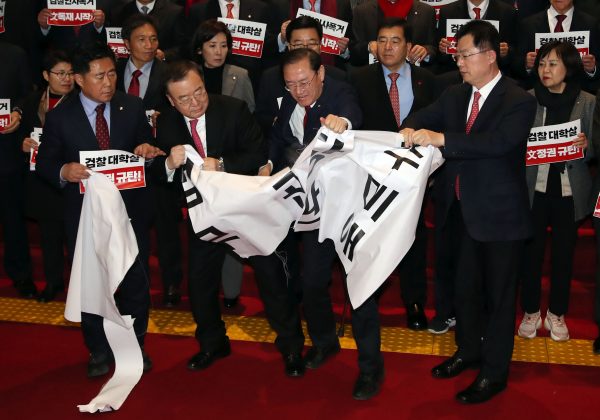Amid public outcry, even among many supporters of Moon and his ‘candlelight administration’, Choo announced her controversial plan to separate prosecutors into two groups — one in charge of investigations and the other in charge of indictments. She claimed that this decision was aimed at correcting a ‘wrong practice of the past’ and to ensure neutrality.
The Justice Ministry offered a four-page summary of the prosecution’s indictment documents instead of submitting the full 71-page version. Ironically, Choo claims that making indictments public is also a ‘wrong practice of the past’. Yet this practice was established in 2005 by progressive president Roh Moo-hyun as part of his criminal justice system reform, in recognition of the people’s right to information. At the time, Moon was Roh’s senior secretary for civil affairs.
President Moon handpicked Choo — a former judge, five-term lawmaker, and leader of the ruling Democratic Party in the National Assembly — to replace former justice minister Cho Kuk who stepped down amid a probe into finance and nepotism scandals involving his family.
Critics suspect that Choo’s mission is to protect the Moon government by blocking Prosecutor General Yoon Seok-youl’s team from investigating the allegations of electoral interference, the Cho Kuk scandal and other alleged abuses of power. Suspicions were deepened when Choo abruptly replaced Yoon’s team of 32 key aides on 8 January without seeking Yoon’s opinion as stipulated in the Prosecutors’ Office Act.
Choo defends her actions as part of Moon’s reform agenda to reduce the ‘almighty’ power of prosecutors. But Moon has ironically turned Yoon into what many South Koreans perceive as a ‘defender’ of the constitutional rule of law and justice against abuses of power by the government. Growing public support of Yoon’s investigation into former and current figures in power has led to Yoon becoming the second most popular candidate for the next presidency in recent public polls.
Despite Choo’s gag order, leading conservative newspaper Dong-A Ilbo published the full text of the indictment document detailing the alleged 2018 Ulsan election interference. According to the indictment, the prosecutors suspected that presidential aides triggered a police investigation into Mayor Song Cheol-ho’s archrival, former mayor Kim Gi-hyeon, just three months before the mayoral election in June 2018. Kim represented the main opposition conservative Liberty Korea Party that has now merged into the United Future Party.
The prosecution concluded that the Ulsan mayoral election was influenced in favor of Song, Moon’s friend of 30 years. In March 2019, Kim was cleared of any wrongdoing.
Voters are becoming increasingly dissatisfied with the Moon administration’s abuse of power. Many South Koreans now consider the current government to be no different to that of impeached former president Park Geun-hye and her conservative Saenuri Party. Ironically, the rise of Moon’s administration was a result of the candlelight protests against Park’s abuse of power.
A prominent scholar of South Korean democracy Choi Jang-jip warned that ‘the nature of crisis in South Korean democracy lies in the progressives’ moral and mental breakdown’. Seoul National University professor Kang Won-taek argues that the Moon administration has become ‘intoxicated with the power of the presidential system’ by which key democratic norms of the separation of powers and self-restraint in the exercise of power are being violated.
Moon has appointed nine out of the 14 Supreme Court justices, including the Chief Justice. He has also appointed eight out of nine justices on the Constitutional Court. All of these newly appointed judges are Moon’s allies. The Blue House has also cultivated deep ties with the National Assembly as Moon appointed former speaker of the National Assembly, Chung Se-kyun, as Prime Minister and former leader of the ruling party, Choo Mi-ae, as Justice Minister.
Many civic groups, including lawyer associations, university professors, judges and prosecutors and even members of the pro-Moon People’s Solidarity for Participatory Democracy, have criticised the Moon administration and the ruling party for violating democratic norms.
This does not mean that the ruling Democratic Party — which has just 129 out of 295 seats in the National Assembly — is in any worse trouble than any of the opposition parties. One of the main reasons that the ruling party is ‘preoccupied with its grip on power rather than with the people’s aspirations, even though it claims to be a regime for the people,’ as one columnist notes, lies in the public distrust of the opposition parties, especially the United Future Party.
With the general election for the National Assembly scheduled for 15 April fast approaching, Moon and the ruling Democratic Party are faced with some serious challenges in dealing with the prosecutor’s investigation of election meddling and other abuses of power. At the same time, South Korea is faced with containing among the worst coronavirus outbreaks outside China, with over 8799 confirmed cases and 102 deaths as of 22 March.
A recent public petition demanding Moon’s impeachment has collected over 1.4 million signatures. This reflects South Korean voters’ collective anger and frustration with Moon and the ruling party’s poor management in safeguarding the people’s lives and safety, and their democratic norms. This collective anger and disappointment risks becoming a fatal blow for the Moon administration.
Hyung-A Kim is Associate Professor of Korean Politics at the School of Culture, History and Language, The Australian National University.


I cannot understand how this anachronistic article could be published on this academic site. I know this may be a little harsh. But the article also too biased. “South Korea democracy in crisis”? not by threat conservative media and prosecutors that the old-regime preferred? but by the president’s office and its allies? It’s a funny, absurd story that’s difficult to understand. Every Korean is familiar with this kind of severe investigation of the prosecutors. Even though this affair is now under the investigation it is not yet concluded. The writer’s viewpoint is biased reaches a hasty self-validating conclusion. I entirely disagree with it, and am very disappointed at its publication.